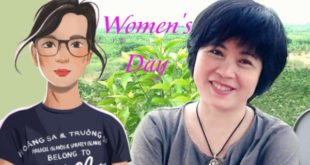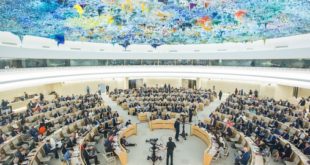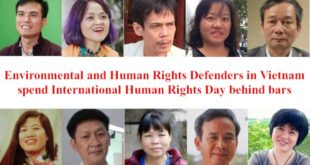PARIS, 20.8.2012 (IBIB) – The U.S. Ambassador to Vietnam, H.E. David B. Shear paid a visit to Patriarch Thich Quang Do, leader of the Unified Buddhist Church of Vietnam (UBCV) at the Thanh Minh Zen Monastery in Ho Chi Minh City, along with Mr. Nicholas J.C. Snyder, Head of the Political Department and Ms. Kathleen Peoples, Political Outreach Officer at the U.S. Consulate in Ho Chi Minh City. The groups of Security Police who keep round-the-clock surveillance on Thanh Minh Zen Monastery stepped back as the diplomatic car bearing US flags pulled up outside.
The meeting took place on Friday afternoon (17 August) and lasted for over an hour (from 3.30pm – 4.45pm). In a phone conversation this morning with IBIB Director Vo Van Ai, Venerable Thich Quang Do said the meeting was very open and cordial. He asked IBIB not to reveal all the details of the discussion, but said he had expressed his concerns to the US Ambassador about a range of issues, from religious freedom violations against the outlawed UBCV to to issues of Chinese encroachment on Vietnamese territorial waters and lands.
The UBCV Patriarch, 83, who is a 2012 Nobel Peace Prize nominee, briefly reviewed the history of Vietnamese Buddhism, from its entry into Vietnam in the 1st century AD through the period of French colonialism and the rule of Catholic President Ngo Dinh Diem, when Buddhism was reduced to the status of a mere association under Colonial Decree No. 10. After Vietnam was unified under Communist rule in 1975, the authorities initially tried to suppress Buddhism by force as it had done in the North, but after failing to do this, they decided to maintain it under strict political control. In 1981 the State-sponsored Vietnam Buddhist Sangha (VBS) was created, under control of the Communist Party’s Fatherland Front. The VBS is a tool of the Communist Party, said Thich Quang Do. Several of its monks even serve as Members of Vietnam’s National Assembly, in blatant contradiction of monastic vows. From then on, the UBCV has been effectively (although never formally) banned. “The Communist regime took everything. They seized all our pagodas, our schools, hospitals, orphanages and charitable organisations. They forbid all our activities, not only religious but also social, humanitarian and educational. But we are keeping up the struggle to preserve our name, our legitimacy, our existence”.
Thich Quang Do described the government’s relentless repression against the UBCV over the past 37 years. UBCV monks, nuns and followers, including members of 20 UBCV provincial representative boards set up to help poor people in the Central and Southern provinces are subjected to systematic harassments, intimidation, assaults and surveillance.
In a “Memorandum on the Situation of the Unified Buddhist Church of Vietnam” which he handed to the U.S. Ambassador, Thich Quang Do said he feared the U.S. underestimated Vietnam’s repression against the UBCV. Citing the State Department’s recent Report on International Religious Freedom, he wrote: “Whilst appreciating the 2011 State Department’s report of abuses against the UBCV, we are concerned that they portray but a pale picture of the systematic Police pressures, harassment and intimidation faced by UBCV Buddhists in every aspect of their daily lives”.
The memorandum cited the case of the Giac Minh Pagoda in Danang, in which the State Department reported that “the Danang People’s Committee advised [the UBCV] to refrain from hanging religious banners or images and from reading messages from one of their monks on Vesak, the commemoration of the Buddha’s birthday” in May 2011. In fact, the Danang People’s Committee strictly prohibited Vesak celebrations at the Pagoda, deploying hundreds of Police and security officials to block all entries to the building, forcibly obstructing and assaulting Buddhists who tried to take part. The reading of the traditional Vesak Message by Patriarch Thich Quang Do was also strictly prohibited.
Moreover, whereas the State Department’s report stated that Thich Quang Do “can meet with others inside and outside the Pagoda” Thich Quang Do told the U.S. Ambassador he is held under effective house arrest without any justification or charge and is forbidden even to preach in the Monastery. Security Police are posted outside the building and keep watch on all his movements. They follow him when he goes out for check-ups at the hospital each month. Every Sunday since anti-China demonstrations broke out in Ho Chi Minh City and Hanoi, he is held incommunicado the Thanh Minh Zen Monastery, denied the right to go outside or receive visits even from UBCV monks or disciples, because Police fear he will try and join the demonstrations along with other UBCV members.
The UBCV Patriarch said that he had also spoken with Ambassador Shear about the grave implications of Chinese encroachment on Vietnamese waters and lands. He stressed that it was in the interests of the U.S., as well as all countries that use the sea lanes in the South China seas, to support Vietnam in its claims to sovereignty. At the same time, he urged the Vietnamese Communist Party to look upon the U.S. as a friend. “If you live next to a very powerful neighbour who spends its time double-crossing you, it is important to know who your friends are”. Otherwise Vietnam could become a vassal of China as before. But to achieve international support, said Thich Quang Do, Vietnam must embark on a process of democratization. “Whether they like it or not, Vietnam will become a democracy some day. But the Party is afraid. They are more afraid of losing the Party than losing the country. This is the tragedy of the Vietnamese people today”.
BUDDHISTS IN DANANG STAGE DEMONSTRATION TO PROTEST POLICE VIOLENCE:
On Friday 17 August, as the US Ambassador visited Thich Quang Do, Security Police in Danang beat and harassed UBCV monk Thich Thanh Quang and Le Cong Cau, a leader of the UBCV Buddhist Youth Movement at the Giac Minh Pagoda. Giac Hoa Pagoda is the Headquarters of the UBCV’s provincial board for Quang Nam-Danang and also of UBCV’s Buddhist Youth Movement, an unofficial educational movement with over 500,000 members nationwide. For the past three years, the local People’s Committee has forbidden all public celebrations at Giac Minh and harassed and intimidated Buddhist followers on the grounds that the UBCV is “reactionary”, “illegal” and “against the State”.
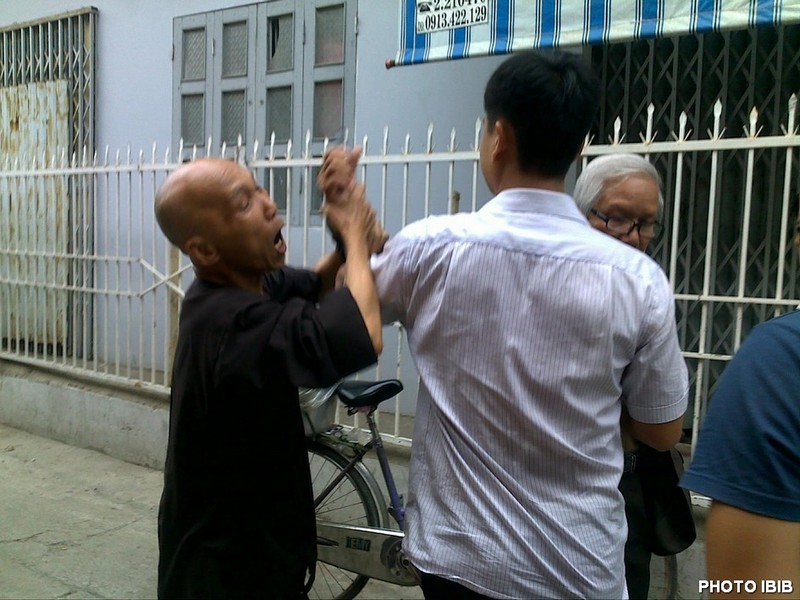
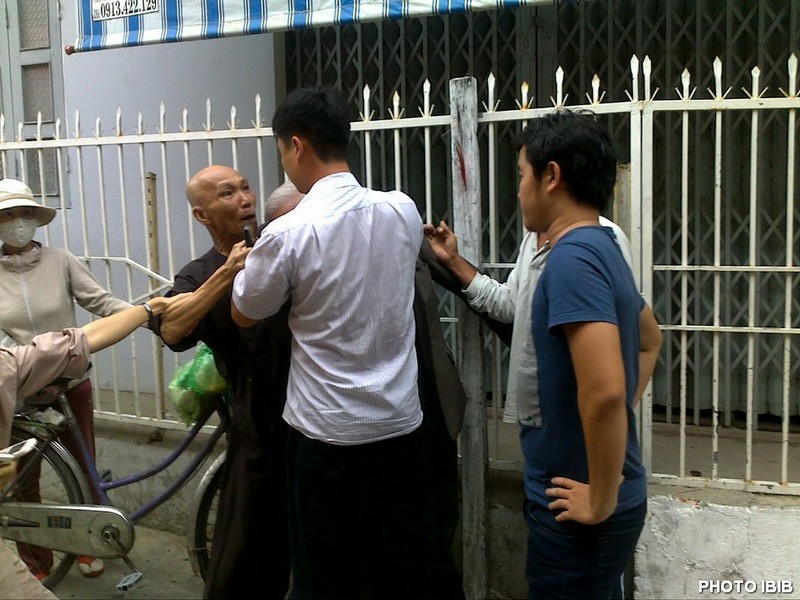
Events began on Friday morning when Le Cong Cau came to visit Giac Minh Pagoda to pay his respects to Thich Thanh Quang for the Vu Lan festival and also to commemorate the death of UBCV Buddhist Ho Tan Quang, who immolated himself in 2001 in Danang to pray for religious freedom. As he approached the Pagoda’s gates, Mr. Cau was intercepted by a group of plain-clothed youths (probably civil defence agents – dân phòng) who pushed him into a lane beside the Pagoda and pressed him against the wall until he could not breathe. They said he must not go to the Pagoda. When Mr. Cau asked why, they said they had no need to explain. He cried out to Thich Thanh Quang, who came running out of the Pagoda with two UBCV nuns, Thich Nu Dong Tam and Thich Nu Dong Hieu. When Thich Thanh Quang tried to free Mr. Cau, the youths set on him, beating the elderly monk and twisting his arm. A crowd of Buddhist followers gathered, and two uniformed Security Police arrived on the scene, but they made no attempt to intervene. On the contrary, they ordered Mr. Cau to go to the Police Station for interrogation. When he refused, the Police accused him of “resisting officials in the performance of their duty” – a crime punishable by seven years in prison in Vietnam.
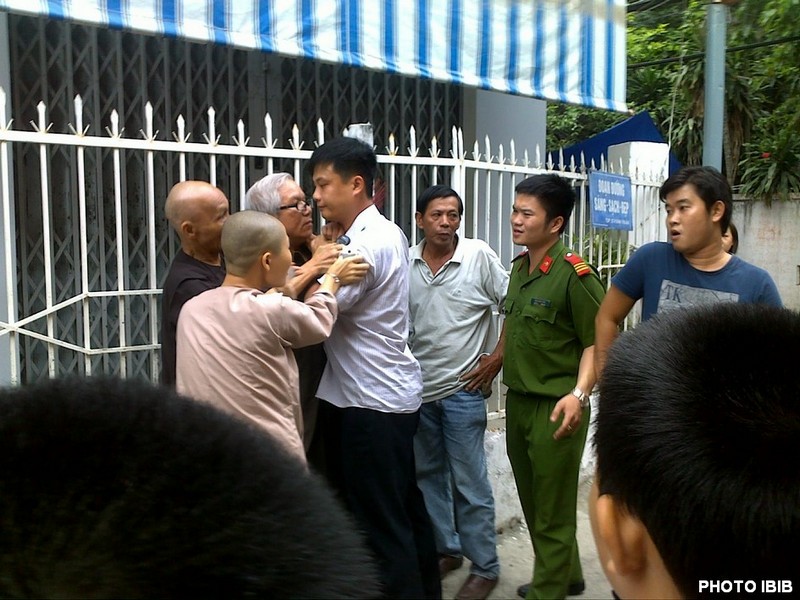
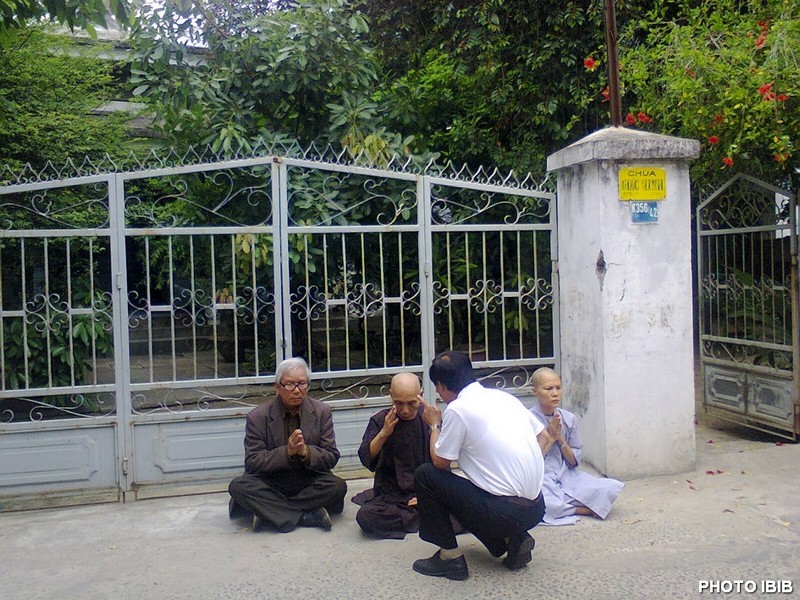
Eventually, Le Cong Cau managed to slip out of the grip of the youths, and ran across the road to the Pagoda’s gates. He immediately sat down in the lotus position in protest and staged a demonstration, joined by Thich Thanh Quang and the two nuns. They sat for two hours in the hot sun. The Police and civil defence agents gradually moved away. Thich Thanh Quang, 75, refused to move, but was eventually persuaded to stop the protest because of his weak health. He has been suffering from malnutrition and other illnesses for the past three years, since the authorities prohibited Buddhists coming to the Pagoda and bringing offerings and medicine. Le Cong Cau told IBIB that he was concerned that renewed Police violence would be used to suppress the upcoming Vu Lan (Wandering Souls) ceremony which will take place on August 30th. —
This post is also available in: Vietnamese
 Quê Me Quê Me: Action for democracy in Vietnam & Vietnam Committee on Human Rights
Quê Me Quê Me: Action for democracy in Vietnam & Vietnam Committee on Human Rights

